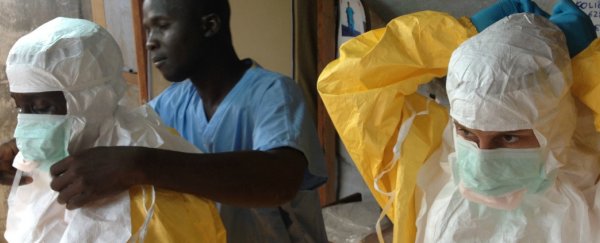A new single-dose vaccine has been shown to be 100 percent effective against Ebola after just one week. The results of a fast-tracked clinical trial involving more than 4,000 people in Guinea offer the most promising evidence so far that we may be able to protect against the haemorrhagic fever.
Known as VSV-ZEBOV, the vaccine is now going through further trials in younger patients, and if all goes to plan could become the first licensed vaccine against Ebola.
As of right now, around 28,000 people in Guinea, Sierra Leone and Libera have been infected with Ebola, and more than 11,000 have died.
The new trial involved vaccinating 4,123 high-risk people immediately after someone close to them became sick with the virus. None of them ended up becoming infected with Ebola.
A second study group of 3,528 people were injected with the vaccine three weeks after they'd potentially been exposed to Ebola. Sixteen of them caught the virus, but the rest were fully protected against the haemorrhagic fever within six days.
"Indeed, no vaccinee developed symptoms more than six days after vaccination, irrespective of whether vaccination was immediate or delayed," the researchers report in The Lancet.
After it became clear that vaccinating people immediately was the best strategy, the international team of researchers stopped waiting to vaccinate those at high-risk of infection.
"The initial results of the study show that the vaccine can effectively contain the further spread of the Ebola virus," the University of Bern in Switzerland, which was involved in the research, wrote in a statement.
"We believe that the world is on the verge of an efficacious Ebola vaccine," World Health Organisation (WHO) vaccine expert Marie Paule Kieny told reporters at a media briefing announcing the results on Friday.
The trial, which was supported by the drug firm Merck, the WHO and the Canadian, Norwegian and Guinean governments, is now continuing in children between the ages of 13 and 17. In the future, the researchers also want to see if they can offer protection to 6- to 12-year-olds.
